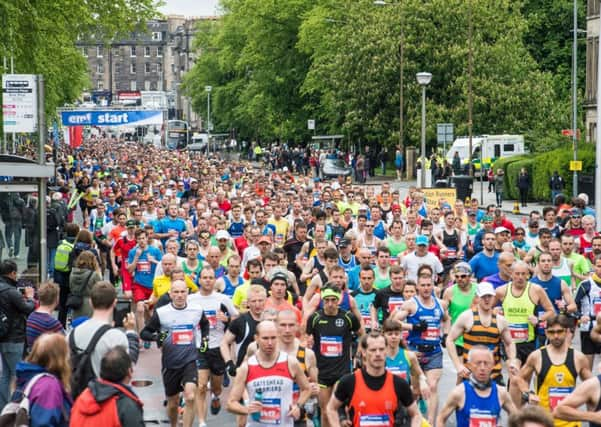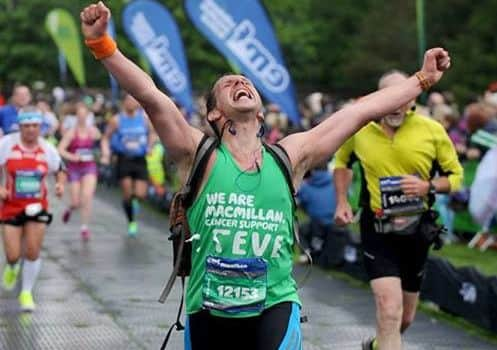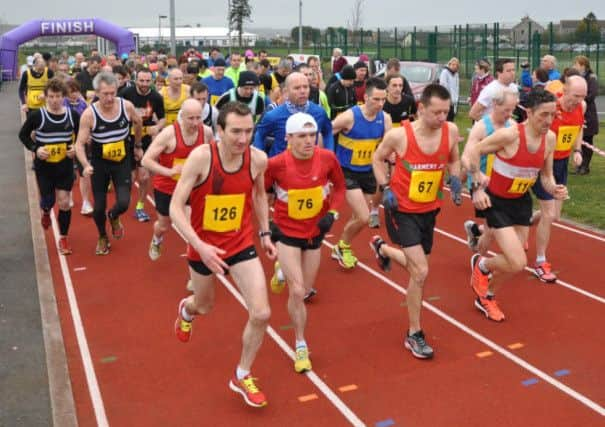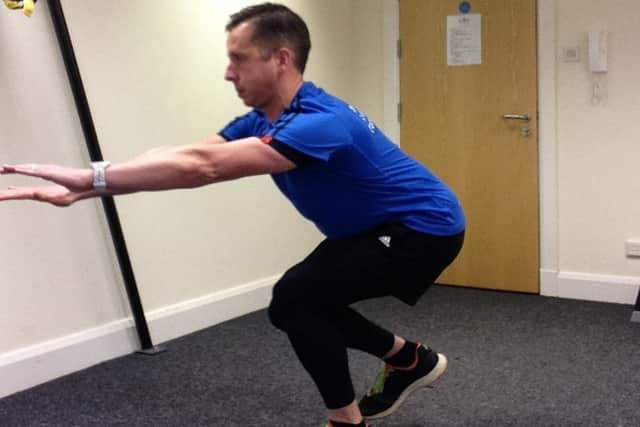Expert advice to prepare for running a marathon in the summer


You’ve decided that you want to get in better shape for the year ahead, but where do you begin?
If you’re training for an endurance event such as a marathon, preparation comes down to two overriding factors: the right nutrition and getting your body prepared for stamina-sapping performance.
NUTRITION
Advertisement
Hide AdAdvertisement
Hide AdRuth McKean is an ASICS Pro Team Dietician and former Scottish National 5,000m running champion. She is a professional sports dietician and advisor to the Scottish Institute of Sport, with 15 years of experience in advising and taking part in elite sports.
McKean said: “The thing to remember is that if you’re doing high-intensity, hill or interval sessions, you need carbs before and after your session. If it’s an easier workout, you can rely a little more on your body fat.
“The most common thing beginner marathon runners do is to try and lose weight; if they’re lean already, they shouldn’t try and cut down on foods. Another mistake people make is that they overeat at night after work, or they strain after work and don’t get all they can out their sessions.”
As well as recognising the need for carbs, McKean identifies eating habits and portion sizes as another potential pitfall for those trying to fuel up correctly.


“Drinks are often the problem, so it’s best to cut out smoothies and fruit juice as it’s far too easy to gain weight this way if you’re struggling with keeping weight down. Porridge, fruit [fresh, frozen or dried] and natural yoghurt with seeds are good energy sources, while nuts are a great high protein snack for mid-morning.
“Eating sensible, regular portions for breakfast, midmorning, lunch and a sensible dinnner later helps, as well as going to work with your own snacks instead of shop-bought food.”
Another aspect to consider during training is the immune system of the runner, with McKean recommending plenty of Vitamin D, dark pigment fruits and kiwis to help boost resistance levels.
For those who cannot derive protein from meat sources, she adds: “Female vegetarian marathon runners can be at risk of becoming anaemic too, so it may be best to seek advice from your GP before training for a marathon.”


Advertisement
Hide AdAdvertisement
Hide AdNutritionist and consultant Natasha Alonzi, of Arcobaleno Nutritional Therapy in Edinburgh, echoes McKean’s belief in the importance of carb-loading and reveals its importance in increasing glycogen stores. Glycogen heightens long-term performance and is worth considering when preparing for an endurance event such as a marathon.
Alonzi said: “Eight days away from the event, on day one eat normally and from days two to four eat a low carbohydrate diet.”
The reverse of the two to four-day approach is true for the remaining days, with high carbohydrate consumption necessary at a level of 7-10 grams of carbohydrates per kilo of body weight.


She added: “When carb-loading, increase your plate [portion] to half carbohydrates, with a further quarter of your plate being protein. Include carbs in snacks such as dried or fresh fruit, bread, rice cakes and oatcakes.”
“Other good sources are root and green vegetables, potatoes, pasta, lentils, rice and pulses. Try not to eat anything new in the week before so that you do not upset your stomach either.”
The procedure recommended by Alonzi also advises a tapering-down of physical activity in the lead-up to the event. On the day before, runners should include a warm-up exercise with three minutes of high activity.
Irene Riach, senior performance nutritionist at the Sportscotland, believes strongly in the importance of eating correctly while training.
She said: “Nutrition is often overlooked initially by athletes as most will immediately think of training as strength and conditioning, physiotherapy or training adaptations made by a physiologist or coach. Even in everyday life people generally see food as energy as opposed to how it can influence how they feel and their performance.
Advertisement
Hide AdAdvertisement
Hide Ad“But the correct nutrition is a vital part of training and recovery. Nutrition is an essential ingredient that underpins all aspects of sporting performance. From a decorated Olympian to a fun-runner, nutrition can make a difference.”


EXERCISE
Despite the importance placed on fuelling your body correctly for the gruelling challenge ahead, the importance of building muscle and both mentally and physically steeling yourself against injury or pain should not be neglected.
Canadian Personal Trainer Maureen Byrne runs Feel the Byrne in Edinburgh and has over 20 years of experience with personal training, health and nutrition. She is also a Bodypump and PowerPlate instructor, with both bachelor and masters degrees in physical education.
“People don’t always understand that the marathon isn’t 26.2 miles on the day; it’s hundreds of miles over a few months,” she said.
After vowing that she’d never do a marathon, Byrne completed her first in Manchester in 2013 and followed this up with Liverpool only a year later - using the excuse of sightseeing as part of her motivation!
“You need to follow a training plan - the discussion has to had with your family and friends that for your next 16 Saturdays, there’ll be a long run and a recovery. Every week, I’ll have a long, slow and steady run to build up endurance in my legs and my overall mental state.
“I’m big on the foam roller for rolling out my quads, and I also use a PowerPlate. I have salt baths to help replace the magnesium I’ve lost after a run, and they also help to relax the muscles and wind down.”
Stephen Bonthrone is a personal trainer based in Perth. After a back problem in his twenties, Bonthrone pushed himself to get fitter and added both the Edinburgh half-marathon and full marathon to his list of achievements in a single day in 2014.
Advertisement
Hide AdAdvertisement
Hide AdWhen he is not inspiring others to change their lifestyles for the better, he is in training for this year’s Paris Marathon.
Bonthrone said: “The first thing I’d recommend is to try yoga. One of the key aspects of marathon-running is flexibility, as people can tend not to stretch enough in training. Get a yoga class integrated into your training from day one, especially as your training progresses.
“In the short term, try to be consistent with your runs. Try and get out for a minimum of three runs a week to begin with, even if it’s just to get your body familiar with running. You should be able to hold a conversation while running without feeling out of breath for approximately 20 or 30 minutes, to start with.”
The Perth-based personal trainer has exercise recommendations which may come as a surprise to those with the mindset that a treadmill is your best friend when training for a marathon.
He said: “Two exercises that make a huge difference are single-leg squats, to help with stability as well as strengthening your hip and ankle joints, and hopping to help ensure there’s less shock coming through your body when you’re running”
“This might be the only race you ever run or could be the start of a new passion in your life, but enjoy the journey, embrace the experience, smile and give it your best shot.”
